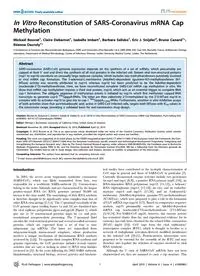
2010 In Vitro Reconstitution of SARS-Coronavirus mRNA Cap Methylation PDF
Preview 2010 In Vitro Reconstitution of SARS-Coronavirus mRNA Cap Methylation
In Vitro Reconstitution of SARS-Coronavirus mRNA Cap Methylation Mickae¨l Bouvet1, Claire Debarnot1, Isabelle Imbert1, Barbara Selisko1, Eric J. Snijder2, Bruno Canard1*, Etienne Decroly1* 1 Architecture et Fonction des Macromole´cules Biologiques, CNRS and Universite´s d’Aix-Marseille I et II, UMR 6098, ESIL Case 925, Marseille, France, 2 Molecular Virology Laboratory, Department of Medical Microbiology, Center of Infectious Diseases, Leiden University Medical Center, Leiden, The Netherlands Abstract SARS-coronavirus (SARS-CoV) genome expression depends on the synthesis of a set of mRNAs, which presumably are capped at their 59 end and direct the synthesis of all viral proteins in the infected cell. Sixteen viral non-structural proteins (nsp1 to nsp16) constitute an unusually large replicase complex, which includes two methyltransferases putatively involved in viral mRNA cap formation. The S-adenosyl-L-methionine (AdoMet)-dependent (guanine-N7)-methyltransferase (N7- MTase) activity was recently attributed to nsp14, whereas nsp16 has been predicted to be the AdoMet-dependent (nucleoside-29O)-methyltransferase. Here, we have reconstituted complete SARS-CoV mRNA cap methylation in vitro. We show that mRNA cap methylation requires a third viral protein, nsp10, which acts as an essential trigger to complete RNA cap-1 formation. The obligate sequence of methylation events is initiated by nsp14, which first methylates capped RNA transcripts to generate cap-0 7MeGpppA-RNAs. The latter are then selectively 29O-methylated by the 29O-MTase nsp16 in complex with its activator nsp10 to give rise to cap-1 7MeGpppA29OMe-RNAs. Furthermore, sensitive in vitro inhibition assays of both activities show that aurintricarboxylic acid, active in SARS-CoV infected cells, targets both MTases with IC50 values in the micromolar range, providing a validated basis for anti-coronavirus drug design. Citation: Bouvet M, Debarnot C, Imbert I, Selisko B, Snijder EJ, et al. (2010) In Vitro Reconstitution of SARS-Coronavirus mRNA Cap Methylation. PLoS Pathog 6(4): e1000863. doi:10.1371/journal.ppat.1000863 Editor: Michael J. Buchmeier, University of California Irvine, United States of America Received November 26, 2009; Accepted March 18, 2010; Published April 22, 2010 Copyright: � 2010 Bouvet et al. This is an open-access article distributed under the terms of the Creative Commons Attribution License, which permits unrestricted use, distribution, and reproduction in any medium, provided the original author and source are credited. Funding: This work was supported, at its initial phase, by the VIZIER integrated project (LSHG-CT-2004-511960) of the European Union 6th Framework, the Euro- Asian SARS-DTV Network (SP22-CT-2004-511064) from the European Commission specific research and technological development Programme ‘‘Integrating and strengthening the European Research area’’, then by The French National Research agency, under reference ANR-08-MIEN-032, the Fondation pour la Recherche Medicale (Programme equipe FRM) to BC, and the Direction Generale de l’Armement (contrat 07co404). MB has a fellowship from the Direction generale de l’Armement. The funders had no role in study design, data collection and analysis, decision to publish, or preparation of the manuscript. Competing Interests: The authors have declared that no competing interests exist. * E-mail:
